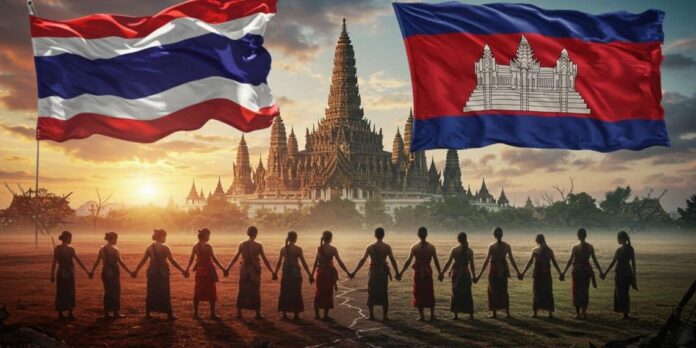As border clashes between Thailand and Cambodia enter their fifth consecutive day, leaders from both nations gather in Malaysia for emergency talks. With over 200,000 displaced and dozens dead, global actors now weigh in.
On Monday, July 28, the acting Thai Prime Minister Phumtham Wechayachai and Cambodian Prime Minister Hun Manet convened in Malaysia’s administrative capital, Putrajaya, in a bid to deescalate the worsening military conflict along their shared border.
The high-stakes discussions, mediated by Malaysian Prime Minister Anwar Ibrahim, began at 3:15 p.m. local time (07:15 GMT) at his official residence. It marks the first face-to-face engagement between Bangkok and Phnom Penh since violence erupted late last week, and occurs under close scrutiny from both Washington and Beijing.
A historical faultline reignites
The Thailand-Cambodia border has long been a source of contention, a legacy of colonial-era demarcations dating back to French Indochina. Yet the region has not seen this level of military confrontation since 2011.
Since Thursday, artillery exchanges and aerial bombardments have reportedly killed at least 35 people and triggered the displacement of over 200,000 civilians. Among the most heavily affected areas are the Surin province on the Thai side and Samraong in northwest Cambodia, where AFP reporters heard shellfire overnight Sunday into Monday.
Accusations and mistrust define early talks
Speaking from Bangkok airport ahead of the summit, Acting PM Phumtham accused Cambodia of acting in bad faith: “We do not believe Cambodia is negotiating sincerely given their actions. A ceasefire is necessary, but it will not restore the status quo,” he warned.
Cambodia’s Ministry of Defense fired back, with spokesperson Maly Socheata stating, “Today marks the fifth consecutive day of Thai military incursion into Cambodian territory, with heavy weapons and large troop movements.”
Thai forces have acknowledged multiple fronts of engagement but frame them as defensive responses to Cambodian aggression.
Fighting continues despite negotiations
Despite the diplomatic setting in Malaysia, fighting has not ceased. Clashes reportedly continued Monday near contested Angkorian-era temples, flashpoints of historical and cultural tension between the two nations.
The escalating conflict has already halted trade routes and cross-border travel, contributing to growing hardship among civilians. Relief efforts remain strained on both sides.
Global players step in: Trump and tariff threats
The Putrajaya talks are not merely regional. Cambodian PM Hun Manet confirmed that the summit is being “co-organized by the United States, with Chinese participation.”
Former US President Donald Trump, re-elected in 2024, personally phoned both leaders on Saturday, urging them to strike a swift accord or risk punitive trade measures. New tariffs are set to be imposed on both export-reliant economies on August 1 unless significant progress is made.
US Secretary of State Marco Rubio, now a key diplomatic actor, announced that American officials are present in Malaysia “to support peace efforts.” He added, “We want this conflict resolved as early as possible.”
A deadly catalyst
The immediate trigger for the flare-up was the death of a Cambodian soldier in late May during a skirmish in a disputed zone. While initially downplayed by both governments, the incident has since escalated into a nationalist flashpoint, leading to mutual recriminations, border closures, and an abrupt end to dialogue.
As talks unfold in Malaysia, the world watches with cautious anticipation. Whether the diplomatic gestures in Putrajaya lead to tangible de-escalation remains an open question.



